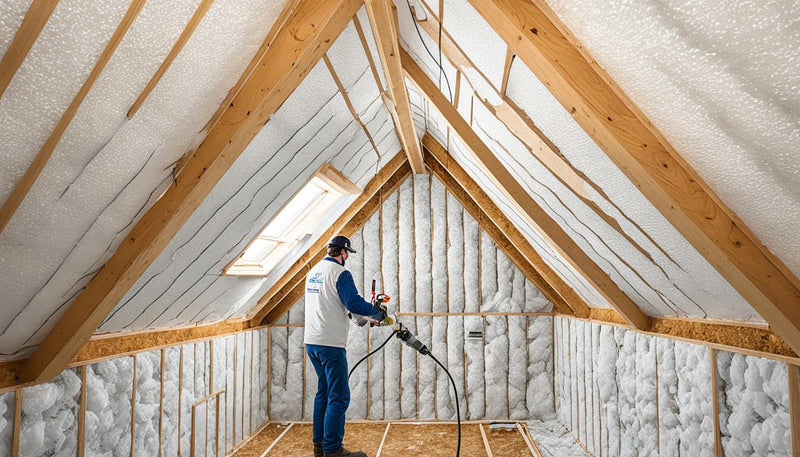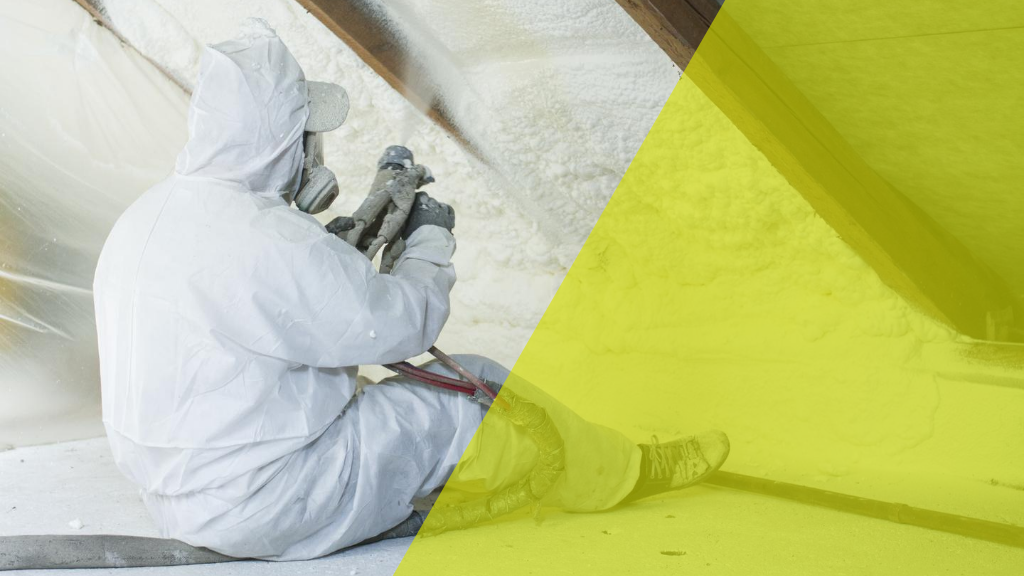Leading Applications of Spray Foam for Residential and Commercial Properties
Leading Applications of Spray Foam for Residential and Commercial Properties
Blog Article
Spray Foam: The Ultimate Solution for Air Sealing and Insulation
Spray foam insulation has actually become a leading option for effective air securing and thermal insulation, using an one-of-a-kind mix of buildings that establish it besides conventional approaches. Its capacity to increase and fill up voids makes it specifically efficient in stopping air leakage, which can considerably influence energy efficiency. However, understanding the complete range of its advantages, installation procedures, and comparisons with other insulation kinds is critical for making notified decisions. As we check out these facets, the effects for both brand-new building and constructions and retrofits end up being progressively considerable. What factors should affect your choice?
What Is Spray Foam?
Spray foam is a versatile insulation product that incorporates the concepts of air sealing and thermal resistance to enhance energy efficiency in buildings. Composed primarily of polyurethane or various other similar compounds, spray foam is applied as a fluid that broadens upon call with surface areas, developing a strong, continual layer of insulation. This one-of-a-kind residential or commercial property permits it to fill voids, cracks, and voids that traditional insulation materials might overlook, supplying an exceptional air seal.
There are 2 major kinds of spray foam: open-cell and closed-cell. Open-cell spray foam is lighter and extra flexible, providing exceptional audio absorption and a reduced R-value per inch - Spray Foam. On the other hand, closed-cell spray foam is denser, giving a greater R-value, moisture resistance, and included structural integrity to developing elements
The application process normally entails specific devices, ensuring a seamless application that complies with various substratums, consisting of metal, timber, and concrete. This flexibility makes spray foam ideal for both new building and constructions and retrofitting existing structures. Its capacity to create an airtight barrier dramatically adds to lowering power usage and enhancing interior air quality, therefore making it a favored choice among house owners and building contractors alike.
Benefits of Spray Foam Insulation
Among the most considerable advantages of spray foam insulation is its exceptional ability to create a constant air barrier, which properly reduces power loss. Unlike standard insulation products, spray foam expands to fill spaces and cracks, making certain that air leakage is considerably reduced. This particular not just enhances power efficiency however additionally causes lower energy costs with time.
In addition, spray foam insulation gives remarkable thermal resistance, adding to an extra secure indoor setting. Its high R-value per inch enables efficient insulation in confined areas, making it ideal for attic rooms, walls, and crawl rooms. Additionally, the moisture-resistant properties of spray foam assistance protect against mold and mold growth, promoting healthier living problems.
One more crucial benefit of spray foam insulation is its sound-dampening high qualities (Spray Foam). It effectively decreases sound transmission in between areas, developing a quieter and more comfortable home environment. The toughness of spray foam also attracts attention, as it does not droop or work out with time, preserving its efficiency throughout its life expectancy
How Spray Foam Works
Comprehending how spray foam insulation functions is essential for appreciating its performance in air securing and thermal resistance. Spray foam insulation consists of two primary parts: isocyanate and polyol resin. When these parts are combined, they undertake a chemical response that creates the product to expand quickly, producing a thick foam that fills gaps, fractures, and dental caries.
As the foam increases, it abides by surface areas, creating an impermeable seal that substantially lowers air seepage. This characteristic makes spray foam insulation very effective at preventing drafts and wetness penetration, which can lead to power loss and damage over time. In addition, the closed-cell variant of spray foam uses remarkable thermal resistance as a result of its rigid framework, properly reducing warm transfer.
The one-of-a-kind properties of spray foam allow it to adapt uneven surfaces, making sure comprehensive coverage and a smooth obstacle. Consequently, spray foam insulation not just boosts energy performance but also adds to improved interior air top quality by decreasing the build-up of contaminants and allergens. Eventually, comprehending the mechanics behind spray foam underscores its role as a remarkable choice for insulation and air sealing in both household and industrial applications.
Installment Process Overview

Prior to setup, the area needs to be appropriately cleaned up and prepped, making sure that surface areas are devoid of dirt, debris, and dampness. This step is vital since impurities can endanger bond and general performance. As soon as the location is prepared, the application includes mixing the two elements of the spray foam, which broadens upon contact and fills voids efficiently.
Educated experts should perform the setup, making use of customized devices to make sure uniform insurance coverage and ideal thickness. Safety safety measures, including using protective equipment and making sure appropriate air flow, are critical throughout this procedure. After application, the foam generally treatments swiftly, developing a strong obstacle that enhances energy performance.
Contrasting Spray Foam to Standard Insulation
When reviewing insulation alternatives, spray foam insulation stands out in contrast to traditional products such as fiberglass and cellulose. Unlike fiberglass and cellulose, which can permit air infiltration, spray foam increases upon application, filling up gaps and voids to create a closed seal.
Furthermore, spray foam provides a greater R-value per inch than typical insulation kinds, offering more reliable thermal resistance in a thinner account. This particular is specifically useful precede with minimal tooth cavity deepness. Spray foam is resistant to moisture and mold and mildew growth, which can be a substantial worry with cellulose and fiberglass, especially in moist atmospheres.
Nevertheless, spray foam insulation normally brings a greater upfront cost than its standard equivalents. Property owners should consider this initial investment against long-term power cost savings and performance advantages. Inevitably, while both insulation types offer their purpose, spray foam arises as a more sophisticated service for contemporary insulation needs, especially in terms of air sealing and thermal performance.

Verdict
In summary, spray foam insulation represents a very reliable option for achieving ideal air securing and thermal resistance. Its special homes, consisting of dampness resistance and sound dampening, make it appropriate for various applications in both new constructions and retrofitting projects (Spray Foam). The preliminary costs might be greater contrasted to traditional insulation products, the lasting advantages, such as significant energy cost savings and boosted interior air high quality, warrant the financial investment and emphasize its worth in contemporary building methods.
Spray foam insulation has emerged as a leading solution for reliable air sealing and thermal insulation, supplying a distinct mix of residential properties that establish it apart from traditional methods.Spray Discover More foam is a functional insulation product find out this here that incorporates the principles of air securing and thermal resistance to enhance energy efficiency in structures.When examining insulation choices, spray foam insulation stands out in comparison to typical materials such as fiberglass and cellulose. Eventually, while both insulation kinds offer their objective, spray foam emerges as a more advanced solution for modern-day insulation demands, particularly in terms of air sealing and thermal performance.
In recap, spray foam insulation represents a very efficient service for accomplishing ideal air securing and thermal resistance.
Report this page